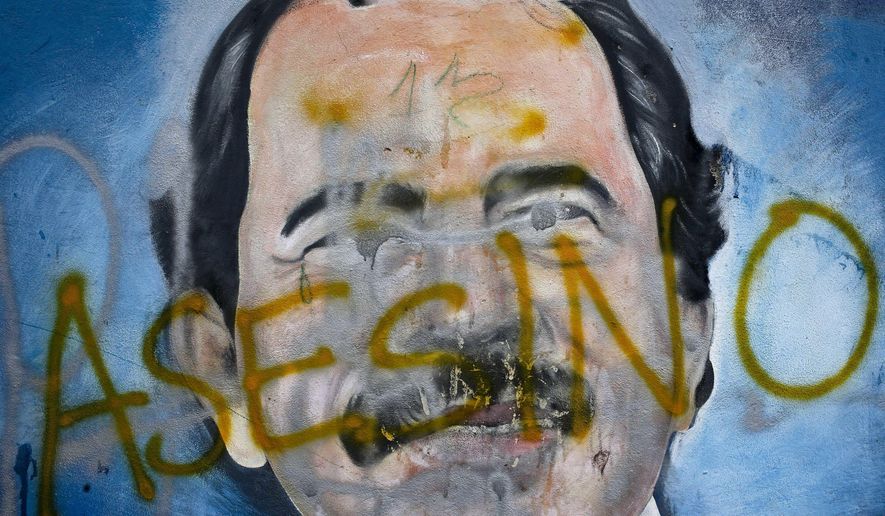A leading congressional voice on human rights said he hopes a hearing highlighting abuses by Nicaraguan President Daniel Ortega’s regime will push the Biden administration and Congress to take even tougher measures against the leader.
Rep. Christopher H. Smith, New Jersey Republican, said in an interview that Wednesday’s joint session of two House Foreign Affairs subcommittees was meant to focus new attention on what he said were the regime’s growing list of human rights abuses and its crackdown on domestic political and religious critics of Mr. Ortega’s rule.
Long an outspoken advocate of human rights, Mr. Smith told The Washington Times in an interview ahead of the hearing that the regime’s recent actions — including the expulsion of 222 dissidents who were stripped of their citizenship and the jailing of a prominent Catholic bishop who criticized the government — suggest even more extreme behavior than Mr. Ortega has exhibited previously.
Mr. Ortega’s “complete commitment to dictatorship” is behind escalating attacks on political opponents and Catholic Church officials in recent years, Mr. Smith said.
Rep. Maria Elvira Salazar, Florida Republican, said during the hearing that the church’s influence in the nation has been a particular irritant to the Nicaraguan regime.
“Daniel Ortega needs to replace the almighty God with his dictatorship,” she said. “And that is why he’s systematically hunting down and silencing the most sacred sovereign institution in Nicaragua’s history, the Catholic Church. The church is the last [and] the loudest voice against his regime.”
Mr. Smith said at the opening of the hearing that the Ortega regime’s “actions call for a very, very strong response. If not, his dictatorship will just wait it out until the coast clears and people aren’t as outraged as they should be. We need to sustain that outrage, but take much more meaningful action.”
Mr. Smith and other regime critics are pressing for tougher U.S. executive branch and congressional pressure on Managua. Among possible moves would be a push to eject Nicaragua from the Central America Free Trade Agreement and legislation further restricting the Ortega regime’s interactions with the U.S.
The State Department’s most recent annual survey of global human rights, released this week, again singled out Nicaragua for harsh criticism, citing what U.S. officials say were credible reports of killings, arrests and torture by the regime, as well as inhumane conditions in the country’s prisons. Human rights groups say the situation has deteriorated badly after the government suppressed widespread public protests in 2018 that Mr. Ortega denounced as an attempted coup.
In early February, the regime expelled the large group of dissidents and sent them to the U.S., stripping them of their citizenship. Some, including Catholic Bishop Rolando Alvarez, refused exile and were jailed while also losing their citizenship.
Pope Francis denounced the moves against Catholic Church members as the actions of a “dictatorship.” He said Mr. Ortega was “unstable.” In response, the regime announced it was “suspending” diplomatic relations with the Vatican.
The House hearing was also called to highlight the treatment of the Bishop Alvarez, who was sentenced to 26 years in prison on Feb. 10.
“What we’re doing is calling for his release, [and] calling for any of us … to go and visit him in prison, but that’s probably not going to happen,” Mr. Smith said in a telephone interview.
If a visit is blocked, he said, it would be good “if the International Committee of the Red Cross could get in and ascertain how well or poorly — and it’s probably the latter — [the bishop] and the others are being treated.”
In another move widely condemned by rights groups, the Ortega regime jailed five potential presidential rivals during the 2021 elections, including attorney Felix Maradiaga and Juan Sebastian Chamorro, a businessman and politician. The two dissidents, among those expelled last month, appeared at Wednesday’s House hearing.
Mr. Smith argued that moves like the arrest of Bishop Alvarez and mass deportation of opponents were a sign not of strength but of weakness for Mr. Ortega.
Mr. Ortega “may have the guns and the bully boys and the secret police to do his bidding, but in the end, all dictatorships eventually meet their demise,” Mr. Smith said.
• Mark A. Kellner can be reached at mkellner@washingtontimes.com.




Please read our comment policy before commenting.